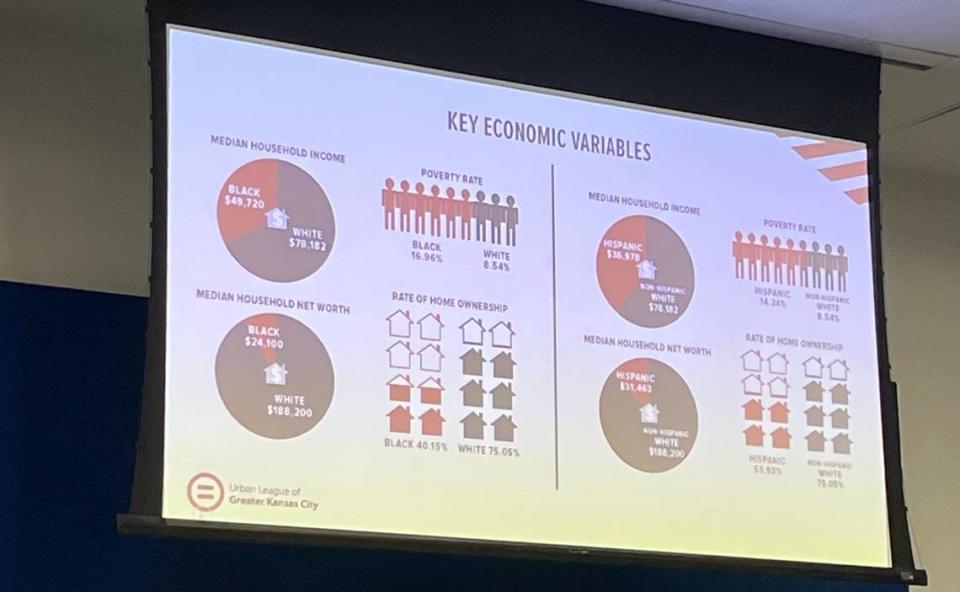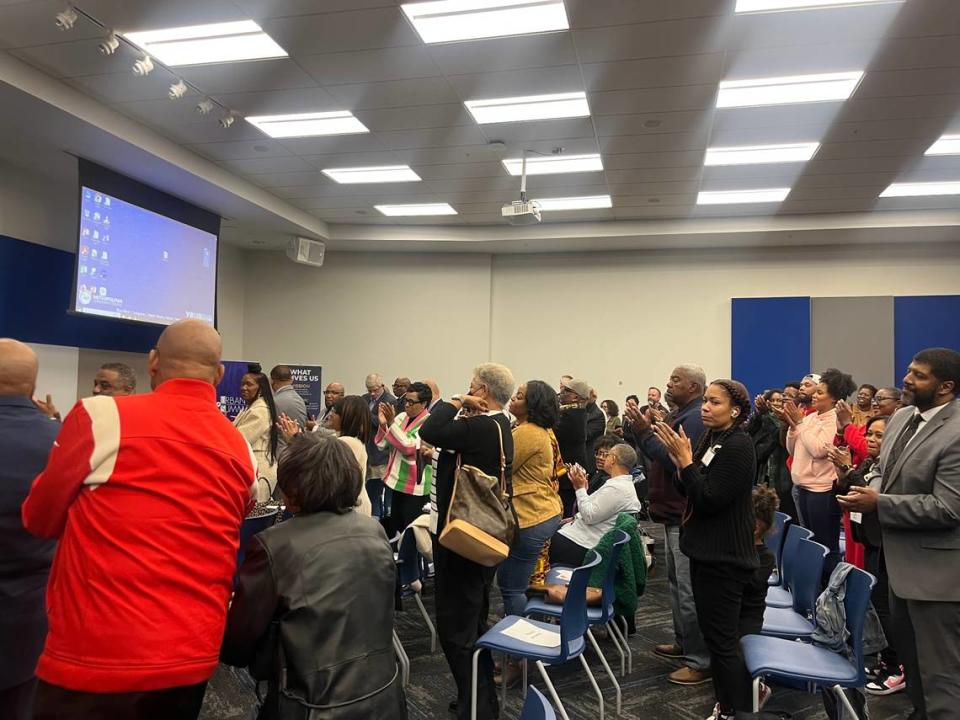Urban Summit discusses state of Black Kansas City with journalist Nikole Hannah-Jones
Black Kansas Citians, young and old, filled a college lecture hall this weekend, anticipating the release of a report about their community and a conversation featuring 1619 Project journalist Nikole Hannah-Jones.
Gwendolyn Grant, president and CEO of the Urban League of Greater Kansas City, stood behind a podium sharing highlights of the State of Black Kansas City report on large screens during the Urban Summit at Metropolitan Community College. The report, titled “From Redlining to Chalk Lines: The Costs of Economic Injustice,” examines the intersection of economics, disinvestment and violence in Kansas City.
On Saturday, the crowd of about 100 people viewed the equality index chart, measuring how African Americans are doing in the areas of economics, education, social justice, health, and civic engagement, compared to white Americans.
The study found that in 2022, the equality index for Black Kansas Citians was 75%, showing that African Americans are missing 25% when it comes to equity compared to white Kansas Citians, according to the Urban League.
Grant explained that the equality index for economics was measured based on median income, poverty, employment, housing, and wealth in the Black community. The slide she presented also showed that the poverty rate for Black residents was 98.6% more than white residents.
Grant refuted the notion that the answer is solely in education and employment, when the median house net worth for Black Kansas Citians is $24,100 compared to $188,200 for white Kansas Citians.
“They’re told that they (Black people) need to get a skill and they need to get a job. Well, this data says that education is truly not the great equalizer. We have a whole lot of educated folks in here, but our data says this is our median house net worth,” Grant said.

As she listed the economic disadvantages that Black people in Kansas City face, a woman in the audience shouted, “Reparations now,” causing the crowd to clap and shout in agreement.
“That’s one of those extraordinary measures that is required because harm was done,” Grant said to the audience. “We’re not going to close these gaps until we address the harm and mitigate it with money … not programs.”
During the panel discussion about the report, the Rev. Vernon Percy Howard Jr., president of the Southern Christian Leadership Conference of Greater Kansas City, challenged African Americans to tap into their economic power.
“Turn to your neighbor and say, ‘What’s that in your hand?’” The crowd turned side to side echoing the message.
“Let me tell you what’s in your hand — $1.6 trillion of Black spending power. An economic tool of bringing justice is the withdrawal of those dollars from institutions that refuse to do justly by our people,” Howard said.
Cierra Haines, 37, who attended the Urban Summit with her mother and sister, found the data to be disheartening, but necessary.
“That gap was overwhelming … but to actually see and pinpoint why there’s a gap was important. I think they did an excellent job making the points clear, and providing solutions to bridge the gap,” Haines said, walking with her family.

Although the statistics were considered alarming, her sister, Syeria Smith, 42, found it motivating.
“It was informative and there was a lot of information about the current status of our economy locally,” Smith said. “I’m born and raised in Kansas City, and I want to make sure that the place we’re in now is one my kids can thrive in.”
After the release of the report, the conversation about reparations and economics continued with keynote speaker and Pulitzer Prize-winning journalist, Nikole Hannah-Jones. The crowd roared, cheering as Hannah-Jones sat in her seat.
‘We can’t allow barriers to paralyze us’
During Hannah-Jones’ conversation with Rev. Howard, who was the moderator, she highlighted that the effects of America’s sins perpetuate the economic gap among Black and white Americans.
“What did slavery do? It extracted all the wealth from Black bodies and Black labor and redistributed that wealth to white people and white institutions,” she said. “What did Jim Crow do? The same thing.”
As she spoke to the crowd of mostly Black Kansas Citians, Hannah-Jones referenced The 1619 Project to correlate with the current economic issues plaguing Black Americans.
The body of work developed by Hannah-Jones and other writers received wide acclaim placing African Americans at the core of America’s narrative. In 2020, Hannah-Jones won a Pulitzer for her personal essay for The 1619 Project.
“That is why at the very basis of the project we have to explain how we got here,” she said. “What allows us to blame Black people for the conditions we live in is the denial of systems that were built to create the conditions.”
As the audience listened, Hannah-Jones further explained the purpose of The 1619 Project, noting that it had been deemed “radical” by critics.
“The 1619 Project is a work of journalism that seeks to answer the question: How did we get the society that we have?” Hannah-Jones said.

She explained that it challenges what most Americans are taught, that the origin story of America began with the Mayflower or the Declaration of Independence. Instead, her project argues that to truly understand America, “we must go to the year of 1619,” when the first slave ship landed on the shores of Virginia, forcing enslaved people to construct a nation.
“Slavery is central to the development of the United States. You would not know this country without slavery and yet we’ve been treated as an asterisk,” Hannah-Jones said.
Near the end of the conversation an audience member asked if reparations are possible.
“We are the closest we have been in my lifetime. That doesn’t mean we will achieve them, but it is no longer a fringe political issue,” Hannah-Jones said.
As the Urban Summit came to an end, a young Black woman stood at the mic and asked what advice Hannah-Jones would give to Kansas Citians leaving the conference. Hannah-Jones left the crowd with a call to act.
“We can’t allow barriers to paralyze us into not taking action at all.”


